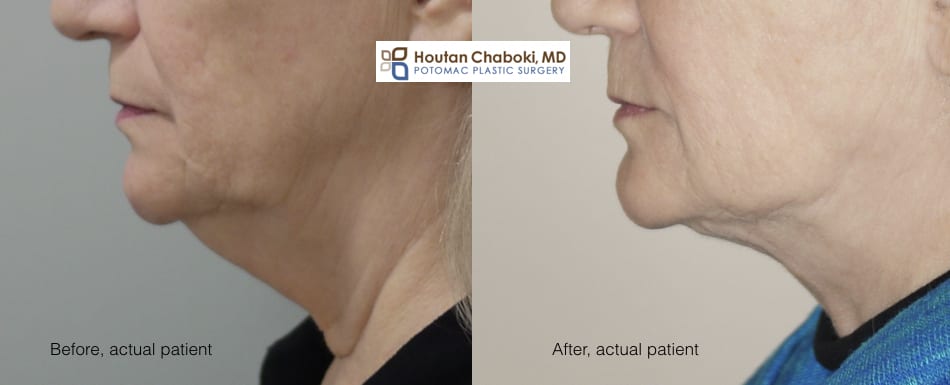
Before and after neck lift with liposuction alone by Dr. Chaboki. Among many decision factors prior to cosmetic surgery, she was a smoker.
Even with the common knowledge that smoking (and vaping) is bad for your health, quitting smoking is difficult for many people. Recent research suggests that cosmetic surgery may help convince some patients to quit for good, if not at least reduce the smoking habit.
Smoking predisposes you to facial aging
First, smoking makes you look older. Many factors, such as sun damage, prematurely age you. Plastic surgeons have stressed the importance of preventative techniques to limit skin damage and to maintain a youthful and energetic appearance. Basic skin care involves adequate hydration, sleep, and sun protection. It also includes not smoking. For patients who want to spend a lot of money on plastic surgery, we recommend smoking cessation first to improve their appearance.
Smoking reduces the duration and results of nonsurgical treatments
Botox®, Dysport®, and facial fillers such as Restylane® are great additions to the field of plastic surgery. Unfortunately, smoking affects these office treatments. In addition to making you look worse, smoking reduces the effect of these liquid facelift office treatments. Results with office injections tend to not last as long in smokers, and as a result patients may end up paying more to get their desired results.
Smoking adversely affects your recovery after cosmetic surgery
Smoking has many negative effects on wound healing. Plastic surgeons advise patients to quit smoking at least 2 weeks prior to cosmetic surgery and not to restart after surgery. Some surgeons will not schedule smokers or cancel if patients don’t follow recommendations.
Lung infection and pneumonia are risks after any surgery, including plastic surgery, for smokers. In addition, the treated surgical areas don’t heal as well or may become infected. Smoking reduces the blood supply and subsequently oxygen and nutrients your body needs. Smokers also have more scar tissue develop after plastic surgery. Lastly, the aesthetic results after cosmetic surgery are more likely to be suboptimal in smokers.
Long-term smoking behavior in cosmetic surgery patients
Vancouver plastic surgeon Dr. Carr and his group have recently reported that plastic surgeons who request preoperative smoking cessation may influence patients’ long-term smoking status. This guidance from a trusted plastic surgeon can help those struggling quit for good.
Their research followed 42 patients, who were daily smokers, prior to and five years after cosmetic surgery. Common plastic surgery procedures included tummy tuck (abdominoplasty), breast lift (mastopexy), and facelift. Based on patient survey after surgery, almost 25% stopped smoking all together, while almost 40% no longer smoked on a daily basis. These cosmetic surgery patients revealed that discussing the increased surgical risks with their plastic surgeon influenced their ability to quit or reduce smoking. Unfortunately, some patients continued to smoke right up to their procedure and continue after plastic surgery. Read the full research article on long-term smoking behaviors in cosmetic surgery patients.
Patients who have cosmetic surgery are motivated to improve their lifestyle, and cosmetic surgery might be their moment to quit.

Leave a Reply